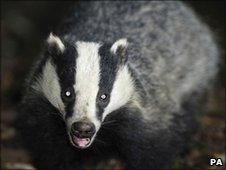Opinions divided after badger cull stopped
- Published

The badger cull has divided communities in north Pembrokeshire
Feelings have been high and opinions have been divided about the Welsh Assembly Government's plans to cull around 1,500 badgers in south-west Wales.
Many farmers and some people living in rural communities backed the pilot cull in north Pembrokeshire, saying action was needed to stop diseased cattle being killed.
But others questioned the cull's effectiveness, saying it had not yet been scientifically proven that badgers are implicated in the transmission of TB within cattle.
After the the appeal court halted the cull, its supporters and opponents gave their reactions:
AGAINST THE CULL
Pembrokeshire Against the Cull (Pac)
The campaign group said the proposed cull was "hugely unpopular in north Pembrokeshire", had divided communities and had affected tourism.
"The science does not support culling as TB actually increases in badgers as their social structure is disrupted. The costs of a badger cull far outweigh any small benefits," it said.
"With injectable badger vaccine available and licensed this is now a very attractive and more acceptable alternative for reducing TB in Badgers.
"We know vaccination works and as infected badgers die out the Welsh Assembly Government's own models suggest vaccination can deliver similar results to culling, without the disadvantages and at lower cost."
The Wildlife Trust of South and West Wales
Sarah Kessell, chief executive of the Wildlife Trust of South and West Wales, said: "Research has repeatedly shown that the costs [of the cull] far outweigh the benefits and that culling badgers could make the situation worse.
"Responses we have received show that the cull is also deeply unpopular amongst the general public and some landowners.
"It is also an unjustifiable cost in these times of financial austerity."
The Badger Trust
David Williams, Chairman of the Badger Trust, said: "Although some farmers may see this judgement as a setback, the massive body of rigorously peer-reviewed literature shows that killing badgers can play no meaningful part in the eradication of bovine TB and that robust cattle measures are sufficient."
Peter Black, Liberal Democrat AM for south Wales west
"Trials of a new badger vaccine are already under way in England and the minister should look at this method of control as a matter of urgency," he said.
"I will be urging her (Rural Affairs Minister Elin Jones) to initiate her own vaccination trial in the former-cull area alongside the cattle control measures she has already announced."
The RSPCA
The animal welfare charity said: "We do not believe that the science justifies it and we believe that vaccination, increased levels of testing, improved bio security and stricter controls on the movement of cattle are more sustainable and effective ways of reducing the incidence of bovine TB in cattle."
FOR THE CULL
First Minister Carwyn Jones
The first minister said the assembly government was looking at the ruling and the defeat in the courts did not reflect poorly on Rural Affairs Minister Elin Jones.
"It's important that we deal with TB in Wales because it's a problem that is growing," he said.
"We will look at the judgment and we will decide how best to proceed. We will consider the implications of the judgment, but what's absolutely clear is that we cannot allow a situation to persist where TB increases year on year in Wales."
NFU Cymru
The farmer's union said the decision to stop the cull was a "bitterly disappointing set-back".
Stephen James, NFU Cymru's deputy president, said: "64% of herds in the Intensive Action Pilot Area (IAPA) have had bovine TB in the last six years and in the absence of an integrated approach to TB eradication this number will only increase.
"That means this insidious disease will continue to spread through the badger population; it will continue to wreck the lives of a growing number of farming families; more cattle and calves will be destroyed as a consequence of our failure to tackle the problem in its totality and more businesses will be ruined."
Farmers' Union of Wales
The Farmers' Union of Wales described it as a "bitterly disappointing outcome".
"The focus must now be on looking at the judgement and drafting a further order so that moves to address the problem in badgers can go ahead," said the union's TB spokesman Brian Walters.
"Farmers are doing their bit to control this disease, yet the court has decided that the most significant obstacle to controlling this disease, namely an highly infected badger population, cannot be addressed until further consideration of the facts is undertaken by the assembly's rural affairs minister."
Nerys Evans, Plaid Cymru AM for mid and west Wales
"It is important that we recognise fully just how hard TB is hitting our farming industry, our rural communities and the Wales public finances generally," she said.
"We're talking about tens of millions of pounds being paid in compensation every year because of this disease that has been allowed to rage unchallenged for far too long."
The British Veterinary Association (BVA) and British Cattle Veterinary Association (BCVA)
Professor Bill Reilly, president of the BVA, said: "Whilst we are deeply disappointed with this judgement it is important to note that the Court of Appeal decision is based on the way the Welsh Assembly Government came to its decision and not on the scientific evidence."
Neil Blake, Chair of the BCVA TB Group, said: "It is important that the assembly government, after consideration of the reasoning for the judgement made, continues to pursue the strategy of this broad, multi-faceted approach to bovine TB; one that should include the option of additional controls of infection in the badger population."
- Published13 July 2010
- Published13 July 2010
- Published10 July 2010
- Published6 July 2010
- Published9 June 2010